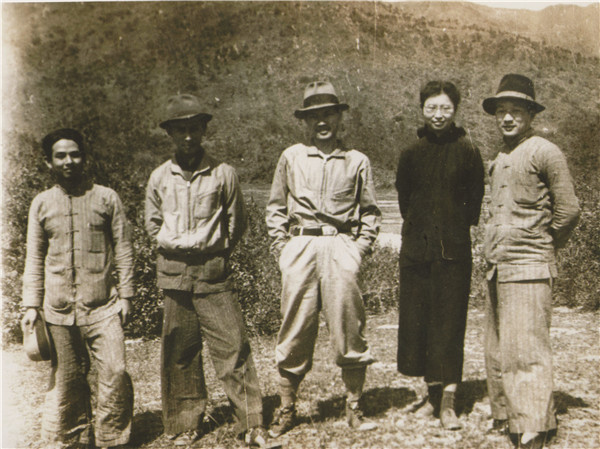Residents feared to walk the streets, facing the threat of torture or death
 |
|
Lam Chun's sister Lam Tsim (second from right) was the first one in her family to join the Dongjiang Column to fight against the Japanese army.PHOTO PROVIDED TO CHINA DAILY |
Survivors of the Japanese occupation of Hong Kong have never forgotten the grim struggle for survival from 1941 to 1945.
Even those who carried on their day-to-day business to support their families did so at the risk of their own lives.
Ho Hing-on, 83, recalls how his mother, who was eight months' pregnant at the time, had to search for every cent at home in an attempt to secure the release of Ho's father from Japanese military police.
With the money she gathered, she paid to visit her husband who was being detained at a Japanese military checkpoint in Admiralty district.
He had been carrying two buckets of cookies and candies to sell when he was detained, but the Japanese were adamant that he had stolen the goods and tortured him, demanding he reveal the source.
He was choked by water being poured down his throat and beaten with rods. His ordeal lasted for almost a day.
"The cookies and candies were from our grocery shop in Wan Chai," Ho said. "My father hoped to earn money for the family by selling them at the Central Market, where there were still many wealthy people."
The extra money was needed because business at the shop had been poor since the Japanese invaded Hong Kong in December 1941. The price of daily necessities had risen dramatically and each day it became more difficult to provide for the family.
'Stuff of dreams'
Kelvin Chow Ka-kin, a senior project officer with the Hong Kong and South China Historical Research Program at Lingnan University, said that by early 1942 the price of daily necessities and food had risen as much as four times since the days just before the Japanese invasion.
Chow has been studying the lives of Hong Kong people during the occupation for 20 years.
When Ho's father recovered from the Japanese torture, he continued his daily pilgrimage to the Central Market, risking further cruelty and even death. "He had no choice ... because he had to raise his family," his son said.
The Japanese had seized most of the food supply. The population of Hong Kong was left with only 20 percent of the original stock, and the public paid dearly for the supplies they needed.
Lam Chun, now 80, lived with her family of five in Ta Kwu Ling Road, Kowloon, during the occupation. Her mother ran a school, but the students stopped attending classes. Her mother had to sell the chairs and desks so the family could buy food.
"The white rice we had for meals previously became the stuff of dreams after the Japanese occupation, during which we only ate porridge with sweet potatoes. Rice was rationed, sometimes as little as 160 grams per person per day," Lam said.
This was about a third of an adult's daily requirement. Lam stayed at home preparing meals, while other family members went about the city to scavenge for anything they could get.
"My mother stopped me going out because it was too dangerous outside," Lam said. "Cooking, eating and sleeping comprised my daily existence."
Cleaning rice took much of her time, as it was of poor quality and mixed with sand and pebbles. "Basically we were eating sand every day, but at least we did not starve," Lam said.
From the balcony of her home, she saw many on the road dying from starvation or exposure to the cold. "Some who were alive in the evening were found dead in the morning. The cleaners would cover the dead with a mat and take away the bodies," she recalled.